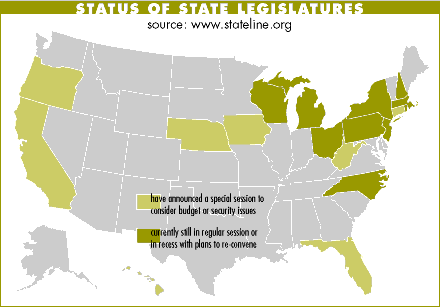
Review notes challenges, opportunities for profession

Associate Editor
AIA Government Affairs released a special report October 24 detailing the economic impact the September 11 attacks will have on state legislative activities affecting architects. Its analysis indicates that AIA state components could face "unanticipated, difficult, and costly" legislative battles.
The AIA will closely track the situation and develop resources to assist chapters with these challenges. AIA research and marketing staff will compile overall economic indicator numbers, with specific emphasis on construction-related activities, and individual state fiscal outlooks. To guide these efforts and develop strategies for the 2002 legislative cycle, the staff held a special conference call with State Government Network (SGN) members, AIA Chief Economist Kermit Baker, and AIA Chief Operating Officer Jim Dinegar.
Challenges
A recent study by the budget forecasting entity Economy.com
states that all 318 of the largest U.S. metropolitan areas will be economically
harmed in the aftermath of the attacks. In fact, as Baker has reported,
during 2001 most state economies had already been slowing.
Stateline.org reports that "lawmakers in every state acknowledge the current slowdown has changed the way they are approaching their fiscal future." Many states' constitutions prohibit their governments from running budget deficits. Legislatures and governors will therefore be looking for ways to increase revenues and decrease expenditures to balance the books.

The AIA's analysis notes that some issues that were high priority may be difficult to advance in this new legislative climate. Particularly hard hit will be items that increase state expenditures and decrease revenue. The list includes tax cuts, open space preservation, transportation and congestion relief, and state and local construction, including capital outlays and issuance of voter-approved bonds. Although these issues may be close to people's hearts, they are hard on state coffers.
Legislators may also need to implement regulatory changes and tap unused revenue sources to address budget shortfalls in areas that will have a direct impact on architects. The report notes that expanding the sales tax to professional services could be proposed, especially in states with no income tax. Currently, fewer than 10 states have this provision. School stock plans and design/build models are another way states will look to change delivery of public construction.
Opportunities
In these challenges there are also possible opportunities for architects.
Legislators may seek solutions that have no direct fiscal impact on the
state but could stimulate job creation. To this end, the AIA is working
to introduce model language for tort and liability reform, pressing for
adoption of a national model building code, emphasizing the economic benefits
of permit streamlining, and stressing the importance of public-sector
outsourcing of professional services. In the wake of the attacks, the
AIA is also calling attention to the need for stronger "Good Samaritan"
laws.
Other opportunities will arise as legislatures become more open to ideas on how to spur economic growth. Several governors are already seeking large increases in public-construction projects. For example, Hawaii Governor Ben Cayetano (D) hopes to spend millions of dollars on such projects to bolster his state's economy. Other ideas will be addressed as many legislatures meet in special session over the next few months.
Finally, as entities are created in the states to address terrorism, security, and disaster-related issues, components are encouraged to proactively recommend AIA members to bring the architects' perspective to these governmental bodies.
SGN can provide good
data
To assist states on meeting challenges and taking advantage of opportunities,
AIA State and Local is asking components to complete the State Activities
Survey, which was sent recently to state component executives and SGN
contacts. Additional copies of the survey are available on the
MyAIA Portal. Search for "Government Affairs Program Survey."
The AIA also is seeking the latest information on special sessions; agency
budgets; and terrorism-, security-, and disaster-related information from
the states.
Copyright 2001 The American Institute of Architects. All rights reserved.
![]()
|
For more information, contact Paul Mendelsohn, program director, State and Local Affairs, 202-626-7388. |
|